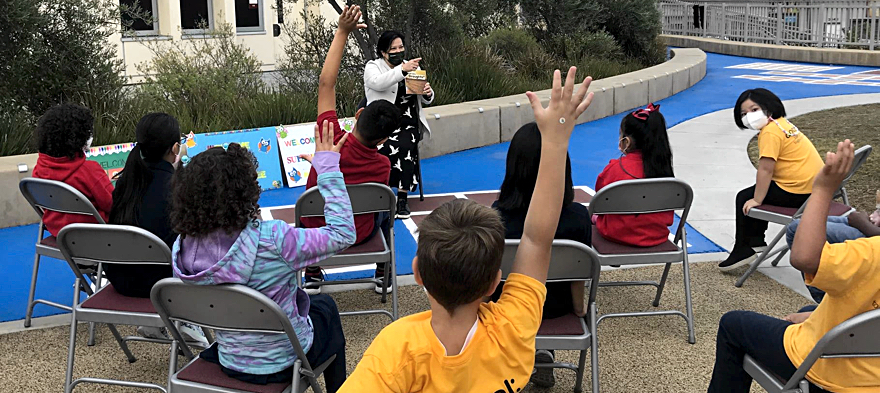
Dec 7, 2021 12:00:00 AM
Sometime this winter, a new superintendent will take the helm of the Los Angeles Unified School District. According to a new poll commissioned by Great Public Schools Now in partnership with Families in Schools and the Center for Equity for English Learners at Loyola Marymount University (CEEL), Los Angeles families want that superintendent publicly evaluated each year.
Surprisingly, a majority of respondents also expressed satisfaction with LAUSD’s pandemic response and transition back to in-person school. [pullquote]Majorities of families in every demographic gave the district high marks for handling the pandemic’s many safety and health challenges in schools and for providing additional academic resources and mental health support.[/pullquote]
“Parents tend to give relatively high marks to their schools” in polling generally, said Ana Teresa Dahan, a spokesperson for Great Public Schools Now. “We weren’t sure how high it would be. That’s probably reflective of the fact that LAUSD has a relatively seamless reopening after being closed for a year.”
Single mom Monicha Boyd, a legal secretary, was one of those parents and guardians who has been delighted with the return to school. “He’s thriving. His grades are good. … Thank God,” she said of her son’s experience so far this school year.
Other key findings point to an agenda for LA’s next superintendent. [pullquote]Overwhelming majorities of respondents want to see the district deepen its efforts to send more dollars to schools in low-income communities.[/pullquote] This includes the more-affluent East San Fernando Valley area. Though support for funding equity was weakest there, 88% of those polled from the region still supported redirecting funds to less-affluent schools. “We know the money is a barrier” to opportunity, said parent and advocate Lisette Duarte. "Your ZIP code really dictates resources.”
In addition, a majority of those polled want the district to increase one-on-one and small group tutoring as part of personalizing and rethinking the school experience for their children. “Education is so individualized,” said Duarte. As a parent, she has worked hard to provide tailored educational experiences for her two children, both of whom are neurodiverse. The arrival of a new superintendent could open the door to approach education in a more collaborative manner with families, she hopes.
The poll surveyed 500 parents and guardians of LA public school students. The respondents reflected overall LAUSD demographics—majority low-income and Latine. For more than three-quarters of families surveyed, all their children attended LAUSD-operated schools, and the rest of the families had one or more children in charter schools. A small subset of families—7%—reported having children in both school settings.
Although Boyd expressed satisfaction with her middle-school son’s return to campus, she also pointed out how much work she had done before the pandemic to set him up for success. Years previously, she fought hard and long to get him an IEP. She still pays for private tutoring. Her son plays travel team basketball and has mentors through 100 Black Men and Big Brothers Big Sisters. “I surround him with successful male role models,” she said. “They don’t have to be Black. That’s what I’m doing on my own.”
Boyd acknowledged that other students had less support and struggled more.
A lot of kids were missing assignments and parents were not home. They had to figure it out on their own. That wasn’t fair.
Monicha Boyd
She would like to see more guides and advocates working to help parents navigate the district bureaucracy. “It’s almost like you have to have a parent one-on-one guide,” she said.
Duarte would like to see a shift in the entrenched adversarial relationship between parents and the district, especially for families of students with disabilities, who may find themselves having to push hard for services their children are legally entitled to receive.
I want to see more genuine parent voice, and that the district be receptive and approach it in a collaborative way.
Lisette Duarte
“People want to come to communities and tell them what they need,” Duarte observed. “You need to meet communities where they are and let them tell you what they need.”
Maureen Kelleher is Editorial Director at Future Ed. She was formerly Editorial Partner at Ed Post and is a veteran education reporter, a former high school English teacher, and also the proud mom of an elementary student in Chicago Public Schools. Her work has been published across the education world, from Education Week to the Center for American Progress. Between 1998 and 2006 she was an associate editor at Catalyst Chicago, the go-to magazine covering Chicago’s public schools. There, her reporting won awards from the Annie E. Casey Foundation, the International Reading Association and the Society for Professional Journalists.
Few issues in education spark more tension and debate than standardized testing. Are they a tool for equity or a burden on students? A necessary check on school systems or a flawed measure of...
Charter schools are public schools with a purpose. Operating independently from traditional school districts, they're tuition-free, open to all students, and publicly funded—but with more flexibility...
Despite the benefits of a diverse teaching force, prospective teachers of color fall out of our leaky preparation pipeline at every stage: preparation, hiring, induction, and retention. Here’s what...
Ed Post is the flagship website platform of brightbeam, a 501(c3) network of education activists and influencers demanding a better education and a brighter future for every child.
© 2020-2025 brightbeam. All rights reserved.
Leave a Comment